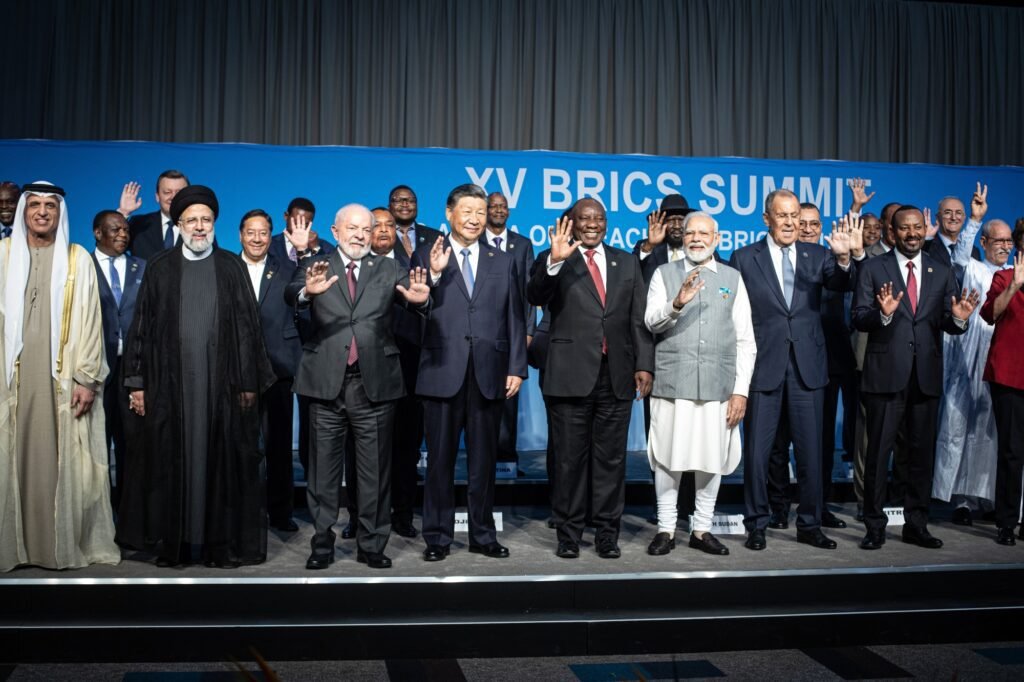From August 22 to 24, the 15th annual BRICS Summit, consisting of major rising economies like Brazil, Russia, India, China, and South Africa, took place in Johannesburg, South Africa. This Summit marked a historic turning point in the Alliance members’ relations with the West, with Russia set to assume the bloc’s Chairmanship in 2024 and the bloc’s expansion.
BRICS stands for Brazil, Russia, India, China, and South Africa. This emerging economic bloc was originally referred to as BRIC, with South Africa later joining the group. The term was coined in 2001 by Jim O’Neill, an economist at Goldman Sachs. The bloc was formed in 2009 to provide a platform for its members to contest a world order controlled by the US and its Western allies. Russia was the driving force behind its creation.
BRICS is not a formal multilateral body like the United Nations, World Bank, or Organization of the Petroleum Exporting Countries (OPEC). It is a group of states comprised of five developing economies that provide a platform for these emerging economies to strengthen their ties and work towards common goals.
The leaders of the state and government of the member countries meet once a year, with each country having a one-year alternating presidency.
In the recent Johannesburg Summit, the BRICS countries extended invitations to join the bloc to Saudi Arabia, Iran, Ethiopia, Egypt, Argentina, and the United Arab Emirates, strengthening its quest to reshape the world order.
BRICS leaders have paved the way for potential enlargement, marking the bloc’s first expansion in 13 years. This move has sparked significant interest from numerous other countries aspiring to join the club, driven by the belief that it will help create a more balanced global landscape.
The recent expansion reinforces the existing BRICS framework, comprising China, the world’s second-largest economy, and Brazil, Russia, India, and South Africa. This move could also align with the bloc’s vocal aspiration to champion the interests of the Global South.
During the summit, South African President Cyril Ramaphosa announced that the six new candidates will officially become members on January 1, 2024. “The BRICS have embarked on a new chapter in their effort to build a world that is fair, just, inclusive, and prosperous,” stated President Ramaphosa. He further remarked, “We have reached an agreement on the first phase of this expansion process, and subsequent phases will follow.”
The selection of countries to join reflects the individual ambitions of BRICS members to expand their alliance.
Brazilian President Luiz Inacio Lula da Silva has openly supported Argentina’s membership, while Russia and India boast robust trade ties with Egypt.
The inclusion of oil-rich nations Saudi Arabia and the United Arab Emirates signals their movement away from reliance on the United States and their aspirations to establish themselves as significant global players.
Moreover, Russia and Iran have found common ground in their resistance against US-led sanctions and diplomatic isolation, and their economic ties have grown stronger following Moscow’s intervention in Ukraine.
Emphasizing the cooperative and collaborative nature of the BRICS group, Russia’s Vladimir Putin asserted, “BRICS is not competing with anyone,” speaking remotely due to an international warrant for suspected war crimes.
Consequently, there is a growing apprehension among some European and American policymakers regarding the evolution of the BRICS. The concern revolves around the potential shift from being an economic alliance of emerging nations dedicated to shaping global growth and progress to transforming into a political coalition driven by principles of authoritarian nationalism.
However, despite their differences, the BRICS and Western nations share several commonalities. Around the world, there has been widespread discontent with the effects of market-driven globalization.
The remarkable growth of China has led the United States, numerous European countries, and even the European Union (EU) to reevaluate their requirements for fresh frameworks and mechanisms. These are essential to facilitate interventionist industrial policies necessary to maintain competitiveness.
The Western unease stems from the BRICS nations’ varying degrees of transformation toward increased nationalism and authoritarianism, except South Africa, over the past decade. This shift has disrupted the global order, incentivizing the West to lean towards more restrictive and less democratic policies as a reaction.
Simultaneously, there are expectations within Eastern countries pushing for adopting more liberal principles, even as they continue to maintain and transform the global order. The BRICS Summit wields the potential to shape global dynamics through strengthened collaboration among these emerging economies.
The key lies in their collective economic strength, technological innovation, and diplomatic influence to challenge established power structures. Yet, achieving this goal necessitates overcoming internal divisions, aligning diverse interests, and translating rhetoric into actionable strategies.
The Summit’s lasting impact hinges on its adeptness in managing geopolitical complexities, advancing sustainable development, and presenting a unified stance on issues like climate change and global governance. It could herald a more balanced and multipolar global order, carrying substantial worldwide implications.
**The views expressed in this article are those of the author and do not necessarily reflect the opinions of The Diplomatic Insight. The organization neither endorses nor assumes any responsibility for the content of this article.















